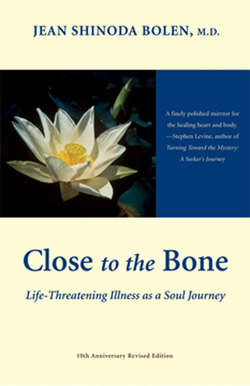Читать книгу Close to the Bone - Jean Shinoda Bolen - Страница 34
На сайте Литреса книга снята с продажи.
Psyche's Tasks
ОглавлениеMany patients are like Psyche, a mythic figure whose psychology resembles many women who survive cancer. Psyche was an abandoned woman when she began the journey that called upon her to complete four tasks, each of which was beyond anything she had done before. Many women with cancer are emotionally abandoned or even left by husbands and lovers; on top of coping with cancer, they then also find themselves having to cope with the aftermath of ended marriages and relationships.
Often, abandonment occurred before the cancer, with depression and lack of reason to live depressing an immune system. When cancer arises, a patient who may have sometimes wished she were dead, now becomes confronted with the reality that she could be dead. For many, this mobilizes an inner warrior, and taps into a wish to live. The cancer then serves as a wake-up call to the importance of life, and in the process of coping with the cancer, the patient discovers strengths she never knew she had.
Psyche's journey was not in response to “a call to adventure,” which Joseph Campbell noted began the Hero's Journey. Nor did she resemble the archetypal hero, who is usually stronger and more advantaged than an ordinary mortal. Each new task seemed impossible at first. The difficulty initially overwhelmed Psyche, and then something (ants, a green reed, an eagle, a talking tower—symbols for the kind of inner strength or knowledge she needed) would come to her aid or give her advice that would enable her to find a way to complete the task and go on, stronger than before.
“Sorting the seeds” was Psyche's first task. She was shown a huge mound of seeds of many kinds, all heaped together, and told that she must sort out this muddled and disordered mass. This metaphoric labor is faced over and over again when a diagnosis or treatment or both are unclear and there are consequences to doing or not doing procedures, or risks or side effects to the treatment, or limited energy or resources, and no guarantees. When cancer is first diagnosed, especially if it is breast cancer or prostate cancer, sorting out treatment choices is a daunting task. Logic and statistical odds or intuition, medical and/or alternative therapies, trust in whom or in what—how to decide in the midst of contradictory and competing information? When it is your life or the life of someone who trusts you with the decision, sorting the seeds is a major task. There are crucial decisions to be made and a return to health or survival can depend upon sorting out what is important. Like Psyche, the first reaction may be to feel overwhelmed. In the myth, lowly ants do the sorting. Trusting in the ants is like trusting intuition: after we assemble a “huge mound” of information and possibilities, and we “sleep on it” or “pray on it” and awake with a solution or an answer, or we find that things seem to sort them-selves out, what to do becomes clear.
Psyche's second task was to “gather a strand of fleece from the golden rams of the sun.” This is a symbol of masculine assertive power, which patients and their advocates often find that they need. Psyche listened to the green reed and acquired what she needed through observation, patience, and timing. She learned that she didn't have to butt heads. Assertiveness often is necessary, especially in hospital settings and large institutions. And, as Psyche learned, timing and patience plus assertiveness often are more effective than head-on confrontations. Mastery of this task is the antidote for women who prior to a serious illness were always accommodating. To know what is needed and seek it requires a strand of masculine assertiveness. This is how cancer can become a cure for codependency.
The third task was to “fill a crystal flask with water.” The water to be obtained emerged from a spring in the highest crag of a huge mountain. It flowed down a deeply etched channel guarded by snake-like dragons on each side and descended into the rivers of the underworld to come up from the depths through the spring. It was a mythic, unending, ever-flowing, ever-returning, eternal stream— the river of life, source of vitality and meaning, that rises from and returns to the unconscious. The task was to contain a small portion of it in a fragile and empty vessel, which each individual ego must do. Physical resistance to illness is often low at a low point in life. People seem to come down with illnesses from colds to cancer during phases when they feel most fragile and empty. In the myth, an eagle accomplishes the task for Psyche. An eagle soars above the landscape, a symbol of the ability to see the big picture that some-one wallowing in her own small miseries does not. When the possibility of death or disability brings a new, wider perspective, and we find we are filled with emotions and a strong will to live, then the symbolic eagle has come to our aid. Just as an eagle does not hesitate to plunge out of the sky to grasp what it seeks in its talons, accomplishing this third task not only puts us in touch with what we feel or need, but it also empowers us to go for it.
